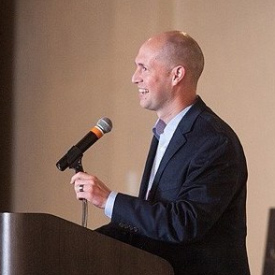On Dads & Reading

A child’s education is about much more than what goes on in “schooling” proper. Education is not an 8am-3pm proposition. It is taking place all the time – in the culture they are being given in their home and family, in the culture they are being exposed to outside of the home (at school, in social media, technology, friends, etc.), and in what they formally learn in both school/homeschool and church. Dads, we are responsible to lead our children in these areas (for more on the role of dads in family culture, read this). So, how do we take responsibility for our children’s education? How can dads step up?
These are important questions, but for many fathers, the answers seem complicated, particularly those who are trying to classically educate their children. After all, children who are being classically educated are reading books their parents never read. They’re studying things their parents never got to study. But, never forget that classical education is also intensely practical. For example, rhetoric (the queen of the curriculum) is really about learning to make decisions.
So, we are trying to give our children an education that few of us received, but that leaves us wondering what role we play in getting them there. Let me start then, with an affirmation: Dads, you can contribute to the classical education of your children. You play an integral role, and this is true whether your children are homeschooled or attend a day school.
How can we be better participants in our children’s education? What is our role in the school or homeschool? How can we be better models of learning for our children? I want to offer some suggestions, beginning with our reading habits as dads.
- Make regular time to read about classical education
If classical education is new to you, take time to read a little about it, even if it’s 15-20 minutes a week. The goal is to gain knowledge that, when reflected upon, turns to understanding and wisdom.
If your children are homeschooled, your reading can end up being a great help and encouragement to your wife, who likely carries most of the weight in homeschooling. As you grow to understand classical education, you will be better prepared to help teach, reinforce, and support what she is doing. You will also be better equipped to help make decisions about homeschooling, giving your wife some relief from her (likely) ongoing battle with “decision fatigue.”
If your kids attend a classical school, your growing interest in classical education provides similar benefits to their teachers, headmaster, and school community. Fathers who understand the purpose of classical education can be a classical school’s greatest ally.
Here are some suggested works for getting started:
- The Abolition of Man by C.S. Lewis
- The Lost Tools of Learning by Dorothy Sayers
- Classical Education (3rd edition) by Gene Veith and Andrew Kern
- An Introduction to Classical Education by Christopher Perrin
- The Core by Leigh Bortins
- The Well-Educated Mind by Susan Wise Bauer
- The Case for Christian Classical Education by Douglas Wilson
- The Liberal Arts Tradition by Ravi Jain and Kevin Clark
- Read to your children
If your children attend school and their teacher reads to them, great. If they are homeschooled and mom reads to them, great. But, your children need to hear you read to them. For one thing, they need to see that reading is not a feminine activity (a message that sinks in unintentionally, subconsciously, and too frequently). Additionally, it helps them see that learning and education are ongoing – it doesn’t end at 3:00. And, when dads read to their children, there is the added practical benefit of being able to read things that aren’t dictated by a curriculum or a daily plan. You can read things because they need them (and there’s not time to read them in the course of the regular school day) or because you simply enjoy reading them together.
Here are some of our family’s favorite series (with 2 boys and 2 girls, ranging from age 6 to 13) This list is focused on good read-alouds for various ages, so there are scores more that would also be great choices:
- 100 Cupboards by N.D. Wilson (although our children would recommend everything written by N.D. Wilson)
- The Wilderking Trilogy by Jonathan Rogers
- Tales of Wonder I & II
- The Wingfeather Saga (four books) by Andrew Peterson
- The Incorrigible Children of Ashton Place (six books) by Maryrose Wood
- The Penderwicks (four books) by Jeanne Birdsall
- Let your children see you read (not the news and not on a screen)
I am a pastor and (obviously) work in education as well, so when I’m working, I’m usually reading. That means, when I finish work, I often don’t want to read. My bent is towards doing physical things, so by the time I leave my office, I would rather be outside – running or some other exercise, yard work, etc. But, I have to remember that it’s important for my children to see me reading.
Think about it from their perspective: mom and/or their teachers often talking to them about the importance of reading, but what happens if they rarely see dad do it?
- Keep books on the nightstand.
- Talk to them about what you’re reading
- Let them see you read
- Surround them with good books – in their rooms, school areas, and throughout the house. Your book collection should make minimalist interior decorators jittery.

Brian Phillips
Dr. Brian Phillips serves as a pastor in Concord, NC, where he lives with his wife and their four children.










